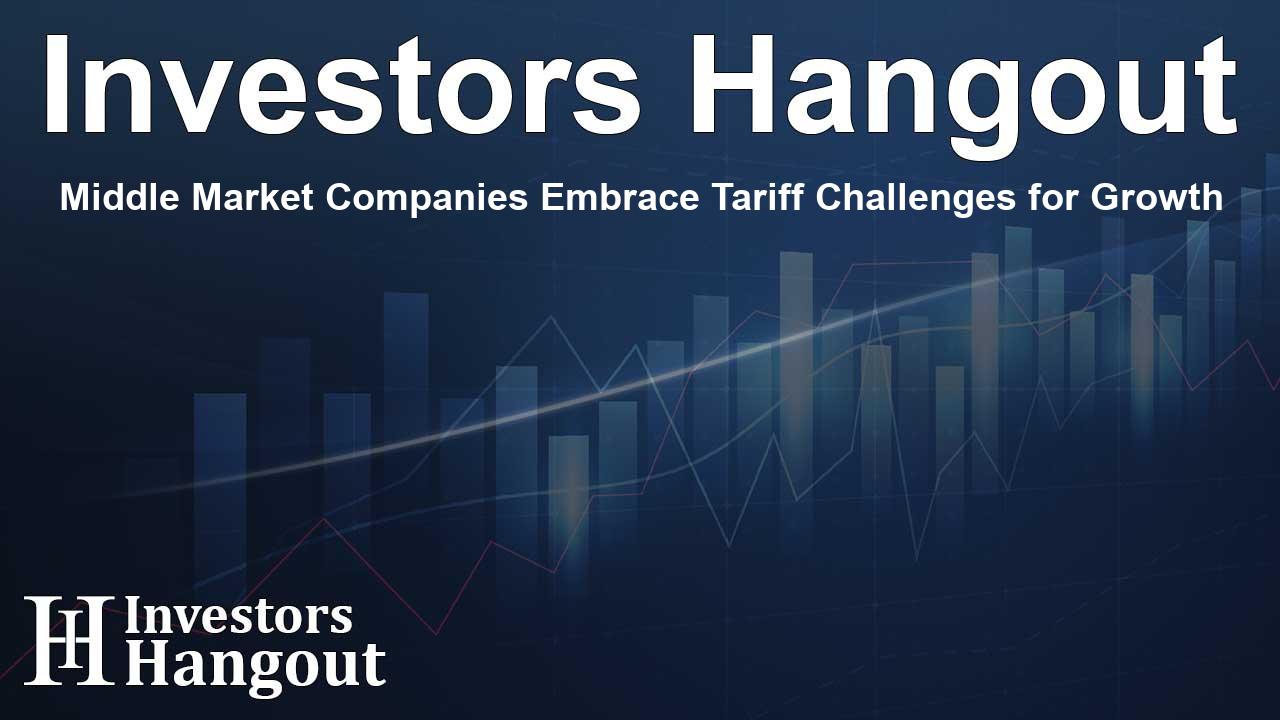Middle Market Companies Embrace Tariff Challenges for Growth

KeyBank Reveals Insights on Middle Market Sentiment
KeyBank has recently unveiled the findings from its Middle Market Sentiment Pulse Survey, providing a look into how middle market companies are grappling with economic uncertainties. Conducted in a time when tariffs impact economic strategies deeply, the survey included insights from executives of firms with annual revenues between $25 million and $1 billion, illustrating their evolving approaches to managing investment decisions, supply chains, and growth initiatives.
The Tariff Landscape: A Double-Edged Sword
In today's economic climate, 91% of surveyed companies are prioritizing tariff impact management, a testament to their strategic foresight. It seems that what might initially appear to be a hurdle can also represent a unique competitive advantage for some businesses. Interestingly, 61% believe that understanding the clarity of the U.S. economic landscape is pivotal for making informed investment decisions.
Innovation Amidst Uncertainty
With 92% of respondents viewing current tariffs and economic policies as catalysts for innovation in their business models, it is clear that many companies are not merely coping but seeking to thrive. While there is a sense of ambivalence about the potential benefits of tariffs, with 49% acknowledging possible upsides, technology firms particularly displayed a notable confidence at 68%. This enthusiasm likely stems from increased software demands aimed at optimizing supply chains.
Strategic Responses to Tariff Challenges
As companies navigate the intricate web of tariff impacts, 60% are adjusting their supply chain strategies to mitigate potential costs. Notably, this figure rises to 74% among larger entities with annual revenues between $500 million and $1 billion. 53% indicated a willingness to pass costs onto customers, and 47% intend to share these burdens with vendors.
Technology Investments for Greater Visibility
For larger companies, 88% are enhancing their technological infrastructures to gain better visibility within their supply chains, while 71% are expanding their supplier networks to reduce risks. These strategic movements illustrate a proactive stance rather than a mere reaction to unfavourable conditions.
Proactive Business Practices in the Face of Tariff Impacts
In a further display of resilience, 87% of companies are actively pursuing ways to broaden their access to capital, reinforcing their financial stability during challenging times. The preferred strategies for this expansion revolve around adopting technology and automation at 52%, increasing equity capital at 43%, and enhancing cash flow management, also at 43%.
The Voice of Leadership
Ken Gavrity, Head of Key Commercial Bank, emphasized the proactive nature of middle market firms. He stated, "Despite the uncertainty surrounding tariffs and economic policies, our pulse survey shows that middle market companies are not just reacting but proactively innovating and adapting. This resilience and forward-thinking approach are key to gaining a competitive edge. It underscores the entrepreneurial spirit that drives America's middle market and reinforces our commitment to supporting their growth ambitions."
He further remarked, "Middle market companies aren't waiting for perfect conditions – they are creating their own opportunities. The businesses that thrive will be those that can adapt quickly, invest wisely in technology, and maintain strong relationships with capital providers who understand their vision."
About KeyCorp
As KeyCorp approaches its bicentennial, it proudly celebrates 200 years of dedicated service to its clients and communities from coast to coast. Headquartered in Cleveland, Ohio, KeyCorp is recognized as one of the nation's largest bank-based financial services organizations, with assets amounting to approximately $189 billion as reported at the end of March.
KeyCorp provides a range of financial services, including deposit, lending, investment, and cash management services through KeyBank National Association across fifteen states. With nearly 1,000 branches and 1,200 ATMs in operation, they offer diverse solutions, including corporate and investment banking products tailored for middle market companies across various sectors nationwide.
Frequently Asked Questions
What key findings were reported in the KeyBank survey?
The survey revealed that 91% of companies prioritize managing tariff impacts, and 92% see current policies as opportunities for innovation.
How are middle market companies adjusting to tariff challenges?
Many are changing their supply chain strategies, with 60% making adjustments and 74% of larger companies actively doing so.
What percentage of companies are increasing their access to capital?
87% of companies are looking to expand their access to capital, adopting strategies like technology integration and improving cash flow.
Who leads Key Commercial Bank?
Ken Gavrity is the Head of Key Commercial Bank, advocating for innovation and adaptability among businesses.
How does KeyCorp support its clients?
KeyCorp offers a comprehensive range of financial services and maintains a solid commitment to support the growth ambitions of its clients.
About The Author
Contact Ryan Hughes privately here. Or send an email with ATTN: Ryan Hughes as the subject to contact@investorshangout.com.
About Investors Hangout
Investors Hangout is a leading online stock forum for financial discussion and learning, offering a wide range of free tools and resources. It draws in traders of all levels, who exchange market knowledge, investigate trading tactics, and keep an eye on industry developments in real time. Featuring financial articles, stock message boards, quotes, charts, company profiles, and live news updates. Through cooperative learning and a wealth of informational resources, it helps users from novices creating their first portfolios to experts honing their techniques. Join Investors Hangout today: https://investorshangout.com/
The content of this article is based on factual, publicly available information and does not represent legal, financial, or investment advice. Investors Hangout does not offer financial advice, and the author is not a licensed financial advisor. Consult a qualified advisor before making any financial or investment decisions based on this article. This article should not be considered advice to purchase, sell, or hold any securities or other investments. If any of the material provided here is inaccurate, please contact us for corrections.
